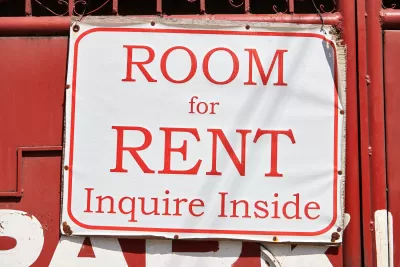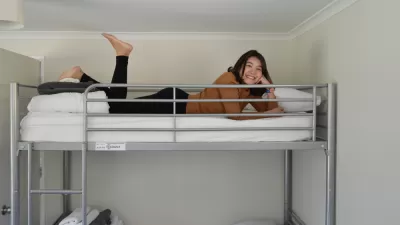Critics argue laws preventing unrelated adults from living in the same home fail to understand the modern American household.

If you’ve ever lived with a group of roommates, it’s possible that the arrangement was technically illegal in your city. As Michael Waters writes in The Atlantic, many U.S. localities have restrictions on the books that limit who can live under one roof. Yet the typical ‘nuclear family’-based household is quickly disappearing, with only 19 percent of U.S. households composed of married couples with children in 2020, down from 44 percent in 1965.
Waters reveals that “A study from last year found that 23 of the 30 largest American metro areas placed limits on the kinds of groups who could buy or rent a single-family home.” And “Though some places permit additional ‘unrelated persons’ (usually two to five) to live under the same roof, others don’t allow any at all.”
These rules, haphazardly enforced, can have serious consequences. “In 2016, the town of Wolcott, Connecticut, refused to allow a group home for people with disabilities to open. A resident of Bar Harbor, Maine, fought the development of a home for seasonal workers (last year, the resident lost the case).” The laws have even affected unmarried couples with children and, in some places, disproportionately affect multigenerational immigrant families or targeted minority groups. “In 1976, Grosse Pointe, Michigan, wielded its ban on unrelated people living together to order out a pair of men—whom press reports implied to be gay, according to [historian Kate Redburn]—from their home.”
Waters concludes, “In the midst of a housing crisis, why restrict living arrangements to any kind of family at all?” More broadly, why should family or relationships be legally defined?
FULL STORY: Where Living With Friends Is Still Technically Illegal

Alabama: Trump Terminates Settlements for Black Communities Harmed By Raw Sewage
Trump deemed the landmark civil rights agreement “illegal DEI and environmental justice policy.”

Study: Maui’s Plan to Convert Vacation Rentals to Long-Term Housing Could Cause Nearly $1 Billion Economic Loss
The plan would reduce visitor accommodation by 25% resulting in 1,900 jobs lost.

Planetizen Federal Action Tracker
A weekly monitor of how Trump’s orders and actions are impacting planners and planning in America.

Wind Energy on the Rise Despite Federal Policy Reversal
The Trump administration is revoking federal support for renewable energy, but demand for new projects continues unabated.

Passengers Flock to Caltrain After Electrification
The new electric trains are running faster and more reliably, leading to strong ridership growth on the Bay Area rail system.

Texas Churches Rally Behind ‘Yes in God’s Back Yard’ Legislation
Religious leaders want the state to reduce zoning regulations to streamline leasing church-owned land to housing developers.
Urban Design for Planners 1: Software Tools
This six-course series explores essential urban design concepts using open source software and equips planners with the tools they need to participate fully in the urban design process.
Planning for Universal Design
Learn the tools for implementing Universal Design in planning regulations.
Caltrans
Smith Gee Studio
Institute for Housing and Urban Development Studies (IHS)
City of Grandview
Harvard GSD Executive Education
Toledo-Lucas County Plan Commissions
Salt Lake City
NYU Wagner Graduate School of Public Service





























